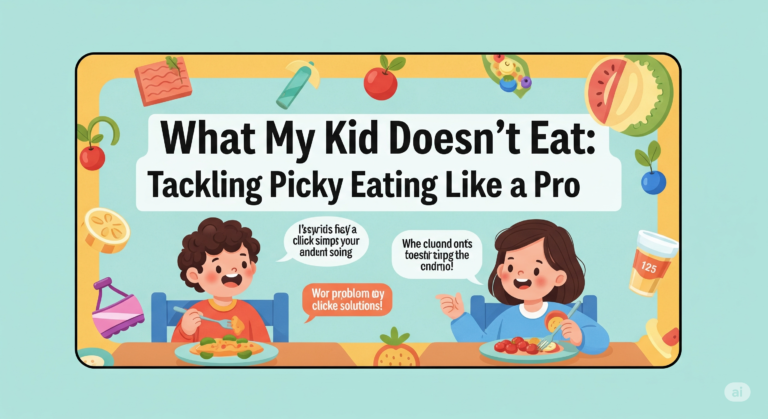Picky eating is a common challenge for parents. If you’re wondering, “Why won’t my kid eat?” you’re not alone! Many children go through phases where they refuse certain foods, leaving parents frustrated. But don’t worry—tackling picky eating can be easier with the right strategies.
Understanding Picky Eating in Kids
Picky eating often starts in toddlerhood and can continue into childhood. Kids may refuse vegetables, try new foods reluctantly, or stick to a limited menu of favorites. According to studies, up to 50% of children show signs of fussy eating at some point. It’s usually a normal part of development, but it can feel overwhelming. The good news? With patience and the right approach, you can encourage healthy eating habits in your child.
Why Kids Become Picky Eaters
- Taste Sensitivity: Children have more sensitive taste buds, making strong flavors like broccoli or spinach less appealing.
- Control and Independence: Refusing food is one way kids assert control.
- Fear of New Foods: Known as food neophobia, some kids are hesitant to try unfamiliar foods.
- Routine Preferences: Kids often prefer familiar foods, leading to repetitive eating habits.
Understanding these reasons can help you approach picky eating solutions with empathy and strategy.
Top Tips for Tackling Picky Eating
Here are practical parenting strategies to help your child embrace a wider variety of foods:
1. Make Food Fun and Engaging
Kids love fun! Turn mealtime into an adventure to make healthy eating for kids exciting:
- Get Creative with Presentation: Cut fruits and veggies into fun shapes or create colorful plates.
- Involve Them in Cooking: Let your child help in the kitchen. Kids are more likely to eat what they’ve helped prepare.
- Use Playful Names: Call broccoli “tiny trees” or carrots “superhero sticks” to spark interest.
Read More:Cute Baby Names Starting With A
2. Introduce New Foods Gradually
Forcing new foods can backfire. Instead, use these picky eating solutions:
- Start Small: Offer a tiny portion of a new food alongside favorites.
- Pair with Favorites: Serve a new vegetable with a dip they love, like hummus or ranch.
- Be Patient: Research shows it can take 10–15 tries for a child to accept a new food.
3. Create a Positive Mealtime Environment
A stress-free environment encourages healthy eating habits:
- Avoid Pressure: Don’t force your child to eat. Pressure can make picky eating worse.
- Eat Together: Kids mimic adults. Eat the same foods as a family to model good habits.
- Keep It Positive: Praise small efforts, like trying a bite, instead of focusing on what they don’t eat.
4. Sneak in Nutrition
If your child refuses certain foods, get creative with healthy recipes for picky eaters:
- Blend veggies into smoothies or sauces (e.g., hide spinach in a fruit smoothie).
- Use whole-grain ingredients in favorite dishes like pizza or pancakes.
- Offer nutrient-dense snacks like yogurt or fruit popsicles.
5. Stick to a Routine
Consistency helps. Set regular meal and snack times to create structure:
- Avoid grazing all day, which can reduce appetite at mealtimes.
- Offer 3 meals and 2–3 healthy snacks daily to keep kids hungry for nutritious foods.
Common Mistakes to Avoid
When dealing with picky eating in children, avoid these pitfalls:
- Bribing with Treats: Offering dessert to eat veggies can make healthy foods seem like a chore.
- Giving Up Too Soon: It takes time for kids to accept new foods, so don’t give up after one try.
- Catering to Demands: Preparing separate meals for your child reinforces picky habits.
READ MORE:Alphabet Letter Tracing (A-Z) Set Of Worksheets
When to Seek Help
While picky eating is usually normal, consult a pediatrician if:
- Your child’s diet is extremely limited, affecting growth or energy.
- They show signs of sensory issues or extreme food aversions.
- Picky eating persists into older childhood without improvement.
A professional can recommend child nutrition tips or refer you to a specialist.
Tackling picky eating doesn’t have to be a battle. By making food fun, introducing new flavors slowly, and creating a positive mealtime vibe, you can help your child develop healthy eating habits that last a lifetime. Every small step counts, so celebrate progress and stay patient. With these parenting tips for picky eaters, you’ll be a pro in no time!



